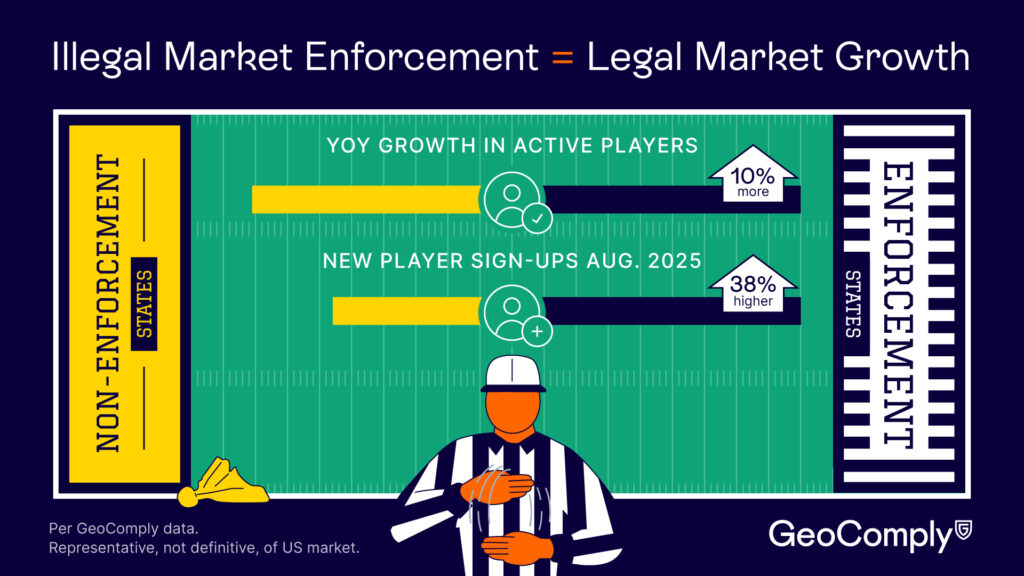Does Enforcement Matter When It Comes To Illegal Books? New Data Says Yes

With the first full weekend of college football in the books, and the NFL season kicking off on Thursday, illegal offshore sport betting operators remain a thorn in the side of the U.S. betting market. Millions of bettors are firing up their apps, searching for the best lines and promos. Most of that action flows through regulated sportsbooks and betting apps. However, a new analysis from GeoComply suggests that enforcement — long debated as either symbolic or toothless — may be the difference-maker in pushing players toward legal books.
Enforcement vs. the Wild West
GeoComply examined player engagement across ten states with similar adult populations this August. Five of those states — Arizona, Louisiana, Massachusetts, Michigan, and Tennessee — have taken visible enforcement actions against offshore sportsbooks in the past year. The other five — Iowa, Indiana, Kentucky, North Carolina, and Virginia — have not.
The results weren’t close:
- Active Players: Enforcement states saw 10% more year-over-year growth in active users compared with states without enforcement.
- New Accounts: Sign-ups were 39% higher in enforcement states, a major win for licensed operators and tax collectors.
GeoComply, meanwhile, credits a combination of enforcement and streamlined onboarding tools such as its IDComply system, which helps keep the funnel open for migrating bettors.
“Enforcement works,” said Kip Levin, CEO of GeoComply. “When states crack down on illegal sportsbooks, players migrate to the legal, licensed market, where they’re protected and where their play generates state tax revenue.”
Why It Matters
The American Gaming Association, in addition, estimates that illegal gambling still makes up nearly one-third of the U.S. market. Because of that, billions in potential tax dollars disappear consumers lack unprotection. Offshore sportsbooks — often indistinguishable to the casual bettor from a licensed operator — continue to be the biggest competition for regulated books.
Earlier this month, 50 state Attorneys General urged the U.S. Department of Justice to escalate action against these offshore platforms. Levin, later, echoed that message, noting that while state crackdowns are effective, “a coordinated federal effort would further accelerate the positive shift.”
The Takeaway for Bettors
For regulators, the findings are validation that enforcement isn’t just political theater — it drives measurable change. For bettors, the story is about awareness. In addition, many don’t realize when they’re wagering with an unlicensed book. Meanwhile, the nunmbers show, once states shine a spotlight, players move to the legal market where protections, deposit security, and recourse actually exist.
As the NFL season gets rolling, the real contest for market share isn’t FanDuel vs. DraftKings or
theScore Bet vs. BetMGM. The real fight pits the regulated market vs. the offshore market. However, according to this data, enforcement proves a winning strategy.
 BetMGM Bonus Code BOOKIESBG150: Get $150 Bonus for NBA Games (Feb. 12)
BetMGM Bonus Code BOOKIESBG150: Get $150 Bonus for NBA Games (Feb. 12)  Best Online Casinos: Real Money Casinos for US Players on Feb. 12
Best Online Casinos: Real Money Casinos for US Players on Feb. 12  Fanatics Sportsbook Promo: Claim $1,000 in FanCash Bet Matches for on Mavericks-Lakers, Olympics 2026 today
Fanatics Sportsbook Promo: Claim $1,000 in FanCash Bet Matches for on Mavericks-Lakers, Olympics 2026 today  ESPN BET Promo Code BOOKIES is Now theScore BET: Grab $1,000 Match Bet for NBA Games (Feb. 12)
ESPN BET Promo Code BOOKIES is Now theScore BET: Grab $1,000 Match Bet for NBA Games (Feb. 12)  DraftKings Promo Code: Claim $300 Bonus for NBA, CBB Games (Feb. 12)
DraftKings Promo Code: Claim $300 Bonus for NBA, CBB Games (Feb. 12)  FanDuel Promo Code: Get $200 in Bonuses for Any NBA, College Basketball Game
FanDuel Promo Code: Get $200 in Bonuses for Any NBA, College Basketball Game
Comments